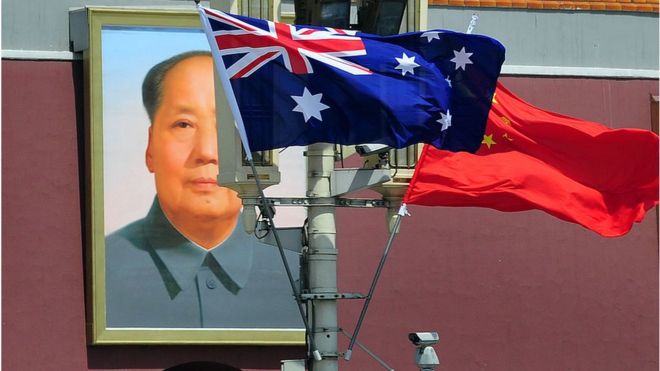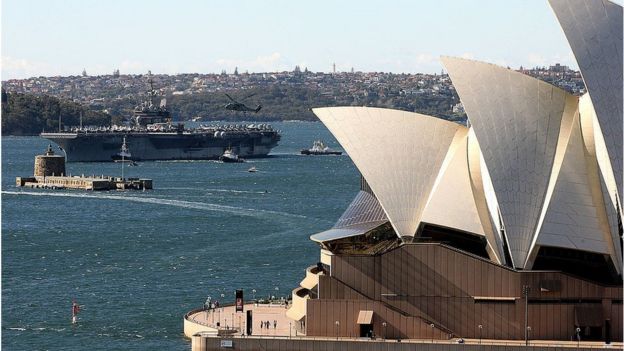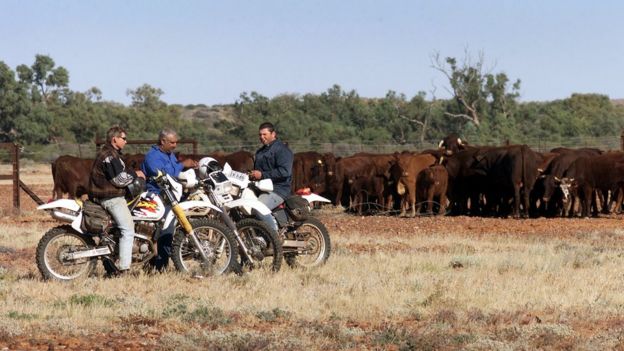Australia Stuck between a Rock (US) and Hard Place (China)?
My first feeling on learning about the Australian/US war games and the China/Russia war games (Sept 11) turned to Australia rather than a mediator to assist countries who are building up in tension due to territorialism, power postures and interests – Australia plays with both sides seeking to find advantage economically and drawn to power.
I always perceive the ‘rock’ as the Rock of Gibralter (unmoving line or column) and the Hard Place (moving line) of the rigid. I see the I Ching yarrow sticks of diviniation. I see the chance in thowing the sticks to see what the future holds. I know about the rigid and crossing the great stream (South China sea). Some have called this freedom navigation. Inner navigation without instruments is the real freedom. Lao Tzu’s words – the rigid are the companions of death comes to my mind. I will google for the words and paste them.
What I feel is that man’s weakness is in his belief that he has to be aggressive, rigid to be strong. This is the downfall of man. I feel this as my answer as I questioned the war games of men. Rather than the world game of Buckminster Fuller. I see the follow of posturing, MAD (mutally assured destruction) and chest beating to scare off the other. The ego has to win which is a real weakness, to win means another is defeated, what you put out comes back. It is only in win/win that democracy is lived and mutually assured survival is guaranteed. I see the folly in old doctrines.
Australia is playing Russian roulette at the Canberra Casino whilst Gandhi (statue) in the peace park is outside silently reminding the politicians in Canberra of the long March for independence, nonviolence and home spun. There is a real message here for Canberra. You cannot place bets both ways and have your cake and eat it. That is why mediation was always the third way. That is the soft approach. However, when industry becomes government, democracy which was the moderator is lost in political action committees seeking to run policy. That is my feeling.
Tao Te Ching (Dao De Jing)
Classic of the Way and Virtue

By Lao Tzu (Laozi)

Compiled by Michael P. Garofalo, Green Way Research, Valley Spirit Center, Gushen Grove Notebooks, Red Bluff, California
Chapter 75 Chapter 77 Index to All the Chapters Taoism Cloud Hands Blog
Chapter 76
Tao Te Ching (Dao De Jing) by Lao Tzu
English and Chinese (Wade-Giles) Terms: Grass (ts’ao), Trees (mu), Soft and Supple is Best, Stay or Stop or Rest (ch’u), Companion or Comrade (t’u), Man or Person (jên), Yielding is Wise, Tenderness, Army or Soldiers (ping), Growing or Born (shêng), Withered, Weak or Gentle (jo), Dry, Rigid or Decayed (k’u), Yielding, Unyielding or Stiff (ch’iang), Below or Lower or Beneath (hsia), Caution Against Strength, Military Power, Tender or Soft or Pliant (jou), Flexibility, Death (ssu), Delicate or Supple (ts’ui), Above or Higher or Superior (shang), Beware of Strength, Ten Thousand (wan), Things or Beings (wu), Fell, Chop Down, Weapons, Hard or Stiff or Rigid (chien), Dry or Rotten (kao), Great or Big (ta), 戒強
Términos en Español: Árboles, Hierba, Suave y Flexible es Mejor, Estancia, Parada, Descanso, Compañero, Hombre,Persona, Ceder, Ternura, Ejército, Creciente, Nacido, Marchito, Débil, Suave, Rígido, Decaído, Inflexible, Inferior, Esconde, Precación, Fuerza, Potencia Militar, Pliant, Flexibilidad, Muerte, Delicado, Por Encima, Superior, Guardaos de Fuerza, Diez Mil, Cosas, Tronchar, Armas, Duro, Seco, Podrido, Grande.
“At birth, a man is soft and weak.
At death, he is strong and powerful.
From grass to trees, all things begin life weak and frail.
At death, they are withered and dry.
Therefore, the Strong and Powerful are disciples of Death.
The Soft and Weak are disciples of Life.
Thus military strength does not ensure Victory.
A tree’s strength is like the army;
the Big and Strong decline,
the Soft and Weak prevail.”
– Translation by Karl Kromal, Chapter 76
** my feeling is to stay below in a receptive position
“Man alive is tender, gentle,
Hard and fast in death.
Living plants are tender, fragile,
Dry and frail in death.
For fast and hard are marks of dying,
And gentle, tender marks of life.
Strength in arms bring destruction,
And the strong branch will be broken.
Let strength and might be put below,
And tender, gentle in control.”
– Translated by Moss Roberts, 2001, Chapter 76
“Abstain from Hardness
Chieh Ch’iang
***the gentleness is the strength. I was speaking this morning about this out of Men That Stare at Goats. This is the lesson.
Man is soft and weak at birth;
At death he is hard and rigid.
The ten thousand things, herbs and trees,
Are soft and delicate when growing up;
In dying, they wither and look haggard.
Thus hardness and rigidity are companions of death;
Softness and weakness are companions of life.
Therefore armies, having become rigid, will not win;
Trees, having become rigid, will break asunder.
The big and rigid will be laid low;
The soft and weak will be lifted up.”
– Translated by Henry Wei, 1982, Chapter 76
***neither side will win.
“When alive, people are pliable and soft; at death, people become rigid and hard.
When alive, grasses and trees are flexible and tender; at death, they become withered and rotten.
Therefore, rigidity leads to death, flexibility results in survival.
It is because of this, the inflexible army would be defeated, like stiff trees would be broken by wind.
The big and rigid would be overtaken by the nimble and flexible.”
– Translated by Thomas Z. Zhang, Chapter 76
“A living person is gentle and tender, while a dying person is rigid and hard.
A living plant is gentle and tender, while a dying plant is dry and withered.
Thus, one who is rigid and hard is on the way to die.
One who is gentle and tender is on the way to live.
Thus, a strong army will soon be annihilated.
A hard stick of wood will soon be broken.
A piece of hard leather will soon be split.
Teeth are stronger than lips, yet the teeth decay first.
Therefore, hardness and strength are inferior, gentleness and tenderness are superior.”
– Translated by Tang Zi-Chang, Chapter 76
“A human body is weak and pliable at birth, and is stiff and hard at death.
Grass and trees are tender and soft at birth, and are dry and brittle at death.
Therefore,
The hard and strong belong to the company of death;
The soft and weak belong to the company of life.
It follows then:
A strong army is destined to be destroyed;
A hard wood tree is doomed to be broken.
The hard and strong are in an inferior position,
The soft and weak are in a superior position.”
– Translated by David Hong Cheng, 2000, Chapter 76
“Humans are born soft and weak.
They die stiff and strong.
The ten thousand plants and trees
Are born soft tender,
And die withered and sere.
The stiff and strong
Are Death’s companions
The soft and weak
Are Life’s companions.
Therefore the strongest armies do not conquer,
The greatest trees are cut down.
The strong and great sink down.
The soft and weak rise up.”
– Translated by Stephen Addis, 1993, Chapter 76
Here is a BBC article. My feeling was Australia stuck in respect of its economic interests and US relationship. Both China and the US have disproportionate influence in Australia which is the result of greed and the need for protection and traditional alliances. Australia is in a dangerous position in my view which will not serve the Australian people as this country is caught up in super power conflict within the context of a declining economic re-order. the toxic mindset is on all sides which is what in truth inflames conflict. They are not operating from a strategic position of wisdom, they are still playing old war games seeking the same outcomes which never work, only civilians suffer as resources are diverted into non-productive pursuits in my view. Until truth sits at the table, fear will run the show.
Pacific grim: Australia torn between US and China
 Image copyrightGETTY IMAGES
Image copyrightGETTY IMAGESIn a recent Australian-made TV political thriller called Secret City, a cyber-attack paralyses the country’s air traffic control system. Authorities immediately (and incorrectly) point the finger at Chinese hackers.
It’s a storyline that’s telling about Australia’s attitude to Asia’s pre-eminent power. On the one hand, China is the country’s biggest trading partner, but it also poses a potential regional military threat that’s drawing the attention of the US, Australia’s closest defence ally.
China, for its part, appears keenly aware of Australia’s apparent reluctance to embrace it fully. In recent months, a series of bilateral irritations have sent relations between the two countries plunging to their lowest point for nearly a decade.
China has rebuked Australia for opposing its military build-up in the South China Sea. Australia has blocked Chinese investment bids, ostensibly on national security grounds. A Chinese newspaper denounced Australia as a “paper cat that won’t last”. Even the countries’ Olympians are fighting with one another.
Troubled relationship
When Australia’s census website crashed this month, throwing the national survey into chaos, speculation about a Chinese cyber-attack ran rife. Peter Cai, a research fellow at the Lowy Institute for International Policy, says it is another illustration of the “troubled state of the relationship”,
While the US has been Australia’s main ally in the Asia-Pacific since World War Two, China has been central to the country’s prosperity and its weathering of two global recessions.
But the balancing act which Australia has managed to perform has grown increasingly tricky of late. The US has switched its focus to the Asia-Pacific just as China asserts sovereignty over much of the South China Sea.
Last month, Beijing accused the US, Australia and Japan of “fanning the flames” of regional tensions, after the three issued a forthright statement urging China to respect an international court ruling rejecting those claims.
 Image copyrightGETTY IMAGES
Image copyrightGETTY IMAGESTensions have spilled out beyond the diplomatic world. During the Rio Olympics, thousands of Chinese took to social media to lambast Australian swimmer Mack Horton, who branded China’s Sun Yang a “drug cheat” after the latter splashed him during a training session.
Power games
And then there’s the issue of direct Chinese investment in Australia. Treasurer Scott Morrison has rebuffed two foreign investment bids – one from Chinese government-owned State Grid, the other from Hong Kong-based Cheung Kong Infrastructure – for a 50.4% stake in Ausgrid, which operates the electricity network in New South Wales state.
Mr Morrison insists domestic political considerations played no part in his decision, which followed his earlier rejection of a Chinese bid for the massive Kidman cattle station.
However, some have noted that following the federal election in July the Senate contains seven pro-protectionist crossbenchers. And although Australia signed a free trade agreement with China last year, there is growing popular antipathy to Chinese ownership of Australian agricultural land and real estate.
 Image copyrightGETTY IMAGES
Image copyrightGETTY IMAGESMr Morrison declined to spell out the security concerns behind the Ausgrid decision, which left some observers scratching their heads – not least because the two Chinese companies already own parts of the power grid in other states. As the news website Crikey observed, in relation to State Grid: “If it’s a national security risk, as Morrison claims it is, then we’re already screwed.”
Toxic mindset
China’s official Xinhua news agency warned in an English-language editorial that the Ausgrid knockback could lead to “a toxic mindset of China-phobia”, adding: “To suggest that China would try to kidnap the country’s electricity network for ulterior motives is absurd and almost comical.”
Australian-Chinese relations have not yet plumbed the depths to which they fell in 2009, when Australian businessman Stern Hu was arrested in China on spying charges. But Mr Cai believes they could deteriorate further if, for instance, Australia joins the US in freedom of navigation exercises in the South China Sea.
Professor Richard Rigby, a veteran China-watcher at the Australian National University, notes that Australia has two China narratives: the economic one, which saw two-way trade increase ten-fold to A$100bn (£58bn) between 2002 and 2012, and the national security narrative.
“But we’ve not been good at all at bridging them,” he said
“Alive, a man is supple, soft;
In death, unbending, rigorous.
All creatures, grass and trees, alive
Are plastic but are pliant too,
And dead, are friable and dry.
Unbending rigor is the mate of death,
And wielding softness, company of life:
Unbending soldiers get no victories;
The stiffest tree is readiest for the axe.
The strong and mighty topple from their place;
The soft and yielding rise above them all.”
– Translated by Raymond Blakney, 1955, Chapter 76
